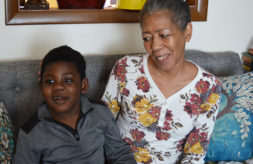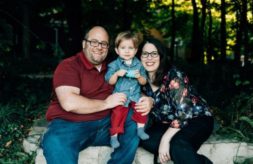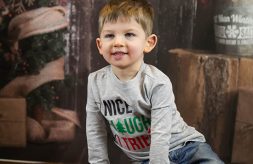The Stearns Family
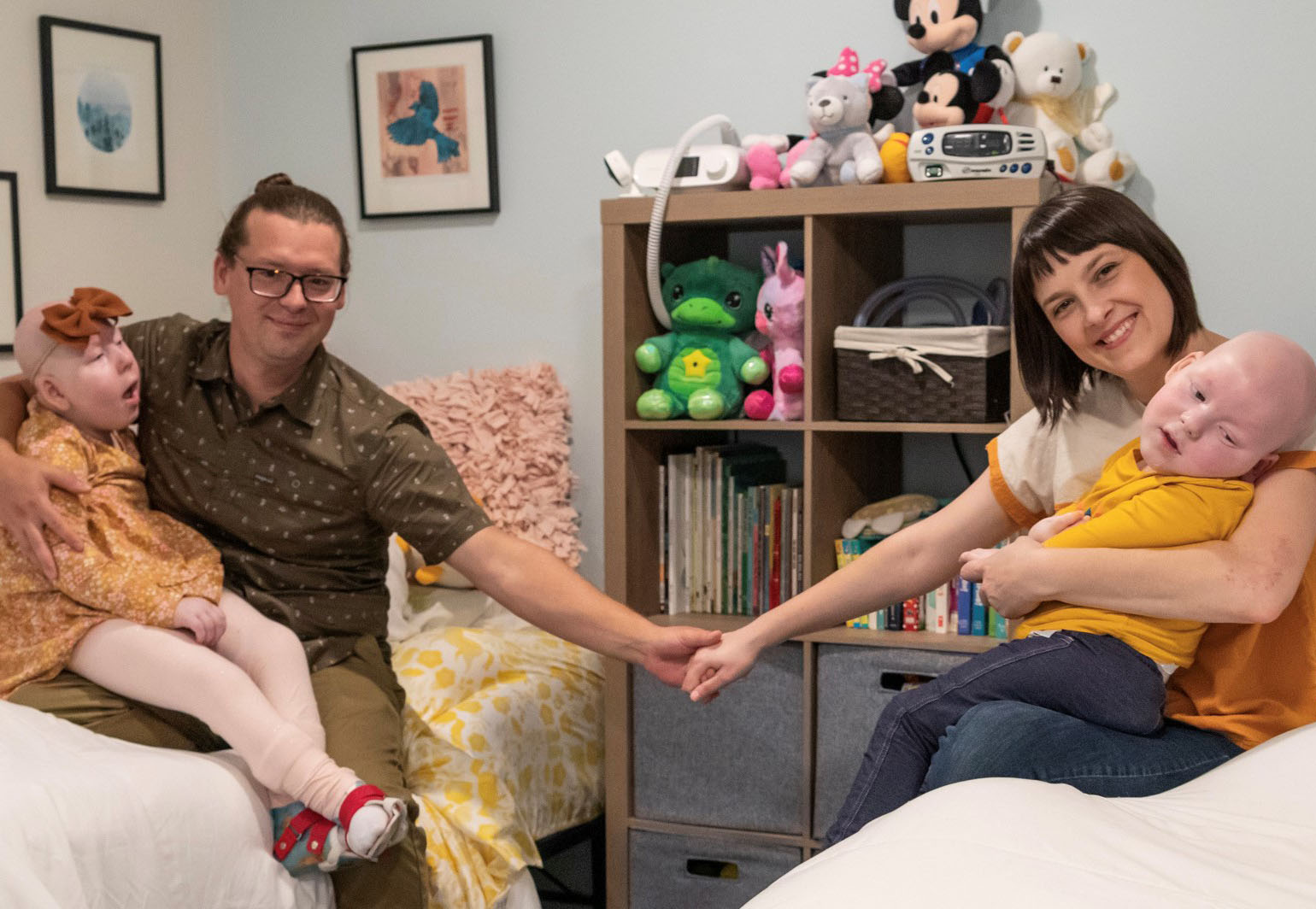
“(The Division of Specialized Care for Children) was one of the first organizations to step into our lives. They were some of the first social workers who came into our home and really began helping us to navigate our new lives with a medically complex child.”
— Erica Stearns, mother of Margot and Caratacus
“DSCC has played a tremendous role in helping our family to thrive”
Before Erica Stearns became the proud mother of two children with complex medical needs, she grew up with disabilities herself.
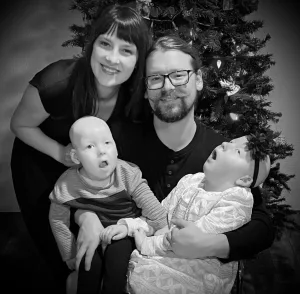
Erica was born with non-isolated tracheoesophageal fistula (also called TE fistula), as well as esophageal atresia, which resulted in permanent vocal cord paralysis. These conditions made her unable to breathe on her own or speak for the first part of her life.
Throughout her early childhood, Erica needed a gastrostomy tube (g-tube) to eat. She also depended on a tracheostomy tube (trach) to breathe until she was a teenager.
Erica unexpectedly found herself on the other side of complex caregiving when her daughter and son were born with a rare disease. Her children now depend on the same life-saving technology she needed as a child.
Though this world was familiar to Erica, there were still many unknowns, fears and intense emotions as she became both a mom and caregiver for her children’s profound disabilities and medical needs.
With support from the Division of Specialized Care for Children (DSCC) and finding community with other caregivers, Erica has developed a strong sense of purpose and empowerment.
She is the co-chair of DSCC’s Family Advisory Council. She is also DSCC’s new Home Care Family Outreach Associate.
In these roles, Erica uses her lived experiences to connect with other families and caregivers, raise awareness of their needs and find solutions to their challenges. These efforts are helping improve the quality of life for both her own children and all Illinois youth with complex medical needs and their families.
“Helping us to navigate our new lives”
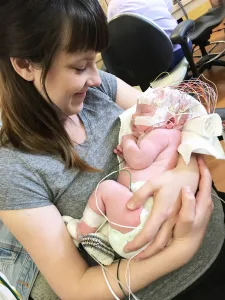 Erica’s children Margot, 7, and Caratacus, 5, were both born with the same rare genetic mutation, lanosterol synthase (LSS), which causes congenital atrichia (alopecia), brain abnormalities, and profound intellectual and physical disabilities.
Erica’s children Margot, 7, and Caratacus, 5, were both born with the same rare genetic mutation, lanosterol synthase (LSS), which causes congenital atrichia (alopecia), brain abnormalities, and profound intellectual and physical disabilities.
Erica and her husband were not prepared for either diagnosis.
“I felt like an outsider, unable to experience the ‘texbook’ parenthood that I had imagined. Even though the medical professionals referred to me as ‘mama’ and reassured me of my expertise on my child, I was overwhelmed by a creeping uncertainty, a gnawing doubt that I might never get to bring our child home with us,” Erica wrote about Margot’s birth and the days that followed.
“My journey was that of a medically complex caregiver, an advocate, a defender, a protector, and, above all else, a very tired mother. Becoming a caregiver to not one, but eventually two children with a rare and medically complex disease, meant that I had to quickly navigate the overwhelming world of medicine, genetic research, advocacy, and all the acronyms that come with this lifestyle.”
Margot and Caratacus both need in-home nursing to safely live at home. They became enrolled in the Home Care Program shortly after birth.
DSCC operates the Home Care Program on behalf of the Illinois Department of Healthcare and Family Services.
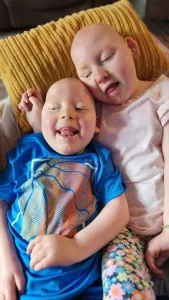
“DSCC was one of the first organizations to step into our lives. They were some of the first social workers who came into our home and began helping us to navigate our new lives with a medically complex child,” Erica said.
This support included connecting the Stearns family with available services and benefits to meet Margot and Caratacus’ complex needs.
Margot and Caratacus both qualify for the Home and Community-Based Services Waiver for Those Who are Medically Fragile and Technology-Dependent (MFTD).
Their DSCC Care Coordinator helped the Stearns family use the MFTD waiver to pay for modifications to make their van accessible for Margot and Caratacus’ wheelchairs and equipment.
The van modification helped the Stearns family take their first family road trip to Kansas to visit family over the summer of 2023. They also got to enjoy an adventure to the Kansas City Aquarium with their medically complex friends and the spending time University of Kansas natural history museum with their cousins.
“DSCC has played a tremendous role in helping our family not just to survive, but to thrive! They helped to provide the means for us to care for our children at home rather than in a hospital or an institution and they have supported us emotionally throughout every step of this journey,” Erica said.
“They are the people who we can guarantee to check in on us regularly, understand our children’s history, tell us about a resource or a charity that might benefit our children, and follow up with us following important events. Our Care Coordinator goes above by sending birthday cards to each of the kids, which I just can’t express it enough how touching and heartwarming that singular gesture is. She is the only person to ever do that for our kids.”
“A safe space” for concerns and input
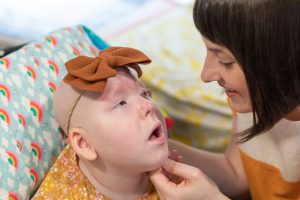
In 2021, Erica became involved with DSCC’s Family Advisory Council (FAC). The council connects families to resources and provides guidance to strengthen DSCC’s teamwork, improve communication and empower families to have a voice in their child’s care.
Erica soon volunteered to chair the council and now serves as co-chair. She said she enjoys the unique opportunity to learn about and discuss current initiatives related to supporting families of children with special healthcare needs.
“All too often, families like our own feel as though many decisions are made without our knowledge or input, which ultimately impacts our children and our family as a whole. The DSCC Family Advisory Council is a safe space where our concerns and our input are not only valued and requested but also received with respect and genuine consideration,” she said.
Erica also appreciates the opportunity to network with other families from across the state and partner with professionals as well. This collaboration helps lead to supportive solutions for families throughout Illinois.
“It brings me immense comfort to know, and be a part of, a team of people who place the family perspective at the center of their discussions and decisions,” she said.
Home Care Family Outreach Associate Role
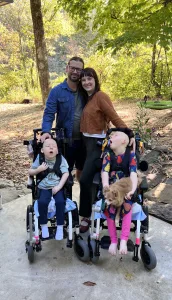
In 2023, Erica began to work for DSCC as our first Home Care Family Outreach Associate.
In this role, Erica works side-by-side with Home Care Program families and caregivers. She provides support by acknowledging shared experiences and helps guide them through the complex systems involved in their child’s care.
Erica also works to create a sense of community for caregivers within DSCC where families feel supported and empowered to navigate caregiving confidently.
“Empowered caregivers, in turn, create a positive ripple effect within their families and their communities,” Erica said.
Visit our Home Care Family Outreach page to learn more about this important role. You can also check out Erica’s HCFOA spotlight video below.
Learn more about Erica and her family
Erica is also the co-creator, host and author at Caffeinated Caregivers. You can read more about her parenthood and caregiving journey in this powerful blog post, “From Battlegrounds to Bridges: My Journey as a Medically Complex Caregiver.”
Erica also started a podcast called “Atypical Truth.” The podcast focuses on issues affecting caregivers, individuals with disabilities and individuals with complex medical conditions. One podcast episode highlights DSCC Care Coordinator Amanda Kaufman, who previously worked closely with the Stearns family.



